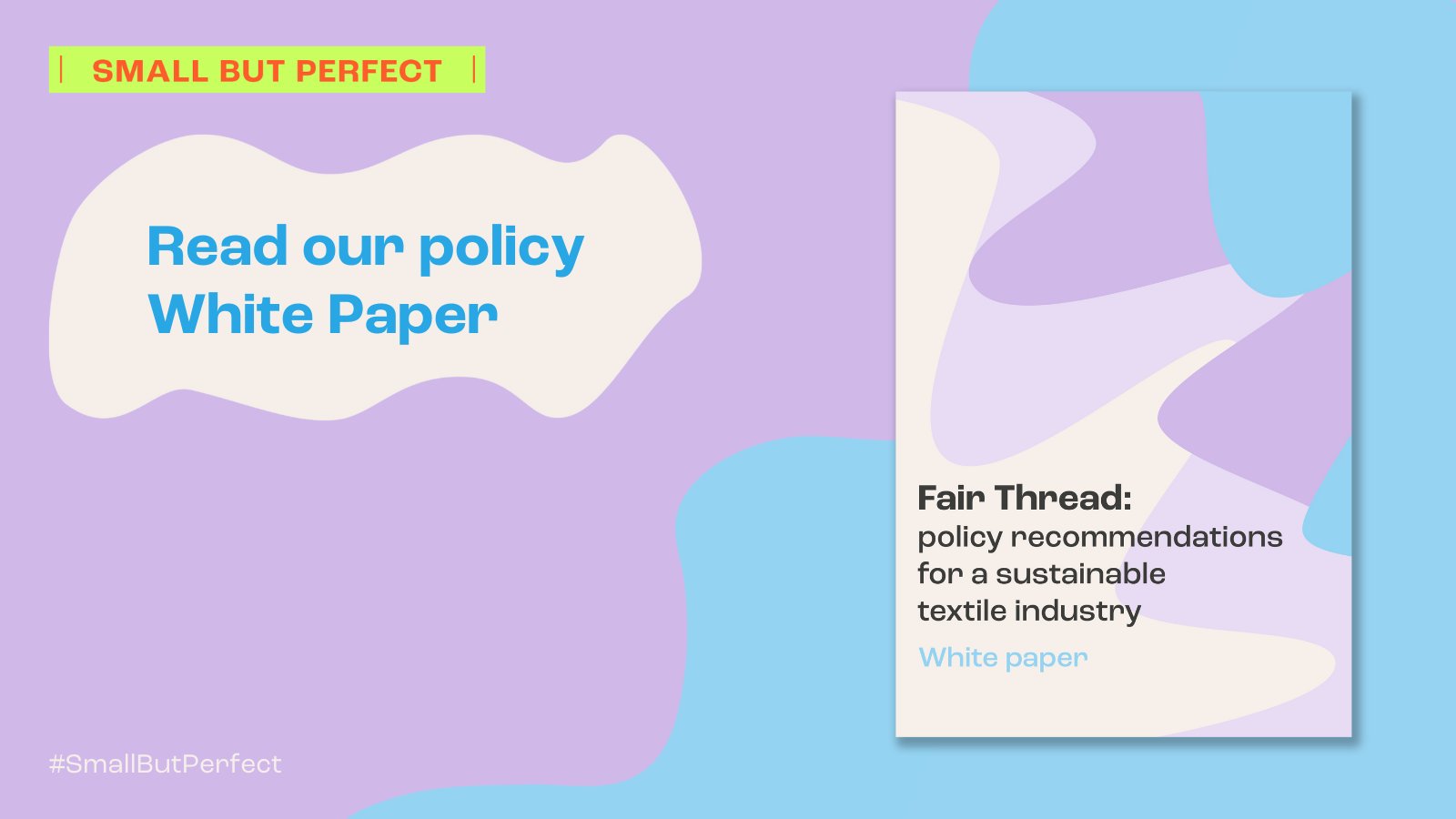We release the White Paper “Fair Thread: policy recommendations for a sustainable textile industry”

Brussels, 4 July 2023 – As part of the Small But Perfect (SBP) project, we release today the White Paper “Fair Thread: policy recommendations for a sustainable textile industry”. This White Paper, jointly written by the Fair Trade Advocacy Office and Fashion Revolution, including a Needs Analysis of sustainable SMEs done by Bocconi University, aims to tackle inequalities stemming from the current fast fashion model.
It highlights 19 policy recommendations urgently needed to improve livelihoods of millions of workers and farmers in the value chains of EU textile companies and show how these policy changes can also be good for Small and Medium Sized Enterprises (SMEs).
The White Paper is based on the outcomes of the SBP project. The input for the Paper is taken from two multi-stakeholder Policy Dialogues exploring enablers and blockers for a fair and sustainable textile sector well as thorough research and the learnings from the network of SMEs, business support organizations and policy makers created during the SBP project.
The Paper covers the topics of:
- Sustainable Business Models
- Traceability and Transparency
- Living Wage and Living Income
- Unfair Trading Practices
- Human Rights and Environmental Due Diligence
- Sustainable Public Procurement
The White Paper picks up on the momentum at EU level to regulate the industry: last month, the European Parliament recently voted on their position regarding two important policy instruments for improving the fashion industry: the Corporate Sustainability Due Diligence Directive (CSDDD) and the EU Strategy for Sustainable and Circular Textile. While this is very welcome the CSDDD limits the scope to big brands with high turnover and therefore has small prospects of leading to real positive change in the textile and garment industry. At the core of the EU fashion industry – making up 98.8% of all EU fashion businesses in 2022 – are Small and Medium-sized Enterprises (SMEs). SMEs are well placed to drive systemic industry change, and should not be left out of the policy conversation. It is also crucial to improve due diligence in the textile sector as particularly power imbalances between brands and their suppliers (often SMEs) lead to numerous human rights and environmental abuses.
Garment brands hold buying power over their suppliers. If manufacturers do not agree to specific buying terms, then the brand can choose to switch suppliers at any moment(1). Brands and retailers use this buying power to unilaterally enforce unfavourable purchasing terms. These unfair trading practices (UTPs) include buying at prices below the cost of production, unilateral changes to agreed contracts, late changes in lead times, and cancelling (semi-)produced garments. Afraid to lose future orders, manufacturers tend to not address these (often) illegal practices and absorb the losses instead. This means the factory does not have enough financial space to invest in safe working conditions, sustainable production methods or living wages for its workers.
At present, the vast majority of fashion brands cannot prove that they are paying their workers a living wage(2). Low wages force people to work excessive overtime to make a living. Working excessive hours in hazardous situations can lead to hand numbness, back problems and eye strain when sewing(3). Respiratory issues, skin disease, burns and even death can occur due to working with toxic chemicals(4). Some workers are forced to skip meals because they cannot afford food for their families(5).
Voluntary initiatives by the industry, such as commercial audits or sustainability platforms, have not been able to fix problems like power imbalances, lack of transparency and dangerously low wages. Companies that do want to take responsibility and produce sustainably are faced with unfair competition from brands that do not consider the environment or human rights in their supply chain.
SMEs are particularly exposed to these challenges, both as brands having to compete with big fast fashion companies, and as manufacturers being faced with Unfair Trading Practices from their buyers. These challenges have not been taken sufficiently into account in upcoming EU legislation
In the SMEs Needs Analysis in the Annex it is described in more detail what regulatory changes SMEs need as well as how current legislative proposals should look to work for SMEs. In order to support European circular and sustainable SMEs in fashion, customised policies are necessary, as well as a customised approach in the implementation of regulations. As highlighted in the Annex, customised approaches could be related to availability of dedicated incentives, adapted timing of implementation depending on the company size, availability of dedicated training for reskilling and upskilling, availability of specific toolkits dedicated to SMEs to reduce complexity.
Read the full paper here.
For any questions around our work on the Textile sector or Due Diligence legislation, please contact May Hylander at hylander@fairtrade-advocacy.org.
References:
- Out of the Shadows: a spotlight on exploitation in the fashion industry, Clean Clothes Campaign (2020), p. 3.
- Tailored Wages: the state of play in the global garment industry, Clean Clothes Campaign (2019).
- Annie Delaney, Rosaria Burchielli and Tim Connor, Positioning women homeworkers in a global footwear production network: how can homeworkers improve agency, influence and claim rights? (2015) 57:4 Journal of Industrial Relations 641.
- Petr Bengsten and Danwatch, Toxic chemicals used for leather production poisoning India’s tannery workers, The Ecologist (2012). Available at: https://theecologist.org/2012/oct/26/toxic-chemicals-used-leather-production-poisoning-indias-tannery-workers
- Penelope Kyritsis, Genevieve LeBaron and Scott Nova, Hunger in the Apparel Supply Chain: Survey findings on workers’ access to nutrition during Covid-19, Worker Rights Consortium (2021).